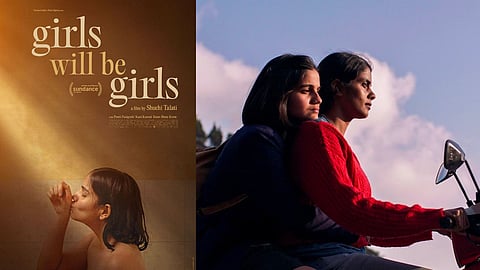
- HOMEGROWN WORLD
- #HGCREATORS
- #HGEXPLORE
- #HGVOICES
- #HGSHOP
- CAREERS
- ABOUT US
- CONTACT US

The intricacies of the mother-daughter relationship have been explored in various cinematic narratives, but Shuchi Talati's debut film, 'Girls Will Be Girls', takes this exploration to a new level of nuance and complexity. Beyond the personal dynamics, the film delves into societal structures and male validation, presenting a narrative that is not only emotionally resonant but also socially relevant.
The film, which competed in the World Dramatic Feature Category at the Sundance Film Festival, managed not only to stand out among 16 films but also secured a win, emphasising its impact and significance. Additionally, lead actor Preeti Panigrahi received a Special Jury Award for her compelling performance, further highlighting the film's excellence.
'Girls Will Be Girls' is the story of Mira, a 16-year-old navigating the challenges of her rebellious coming-of-age, complicated by the presence of her young mother who never had the chance to fully experience her own youth. Set against the backdrop of a strict boarding school in the Himalayas, the film depicts a tale that explores the delicate balance between tradition and burgeoning sexuality.
What sets this film apart is its careful examination of the mother-daughter dynamic, where the characters perpetually reflect each other, embodying what they might become and what they could have been. The final moments of the film are particularly poignant, creating an overwhelming tenderness that resonates with audiences, thanks to the effective storytelling that precedes it.
Talati's directorial skills shines through, as she handles the evolving narrative with confidence and sensitivity. The film expertly observes the tension between Mira and her mother, Anila, as their relationship transforms from one of shared secrets to a complex rivalry for the attention of a new student. The subtle shifts in tone are masterfully captured, with scenes where the characters barely speak, yet the unspoken glances carry a thrilling undercurrent of rebellious angst.
The film also stands out in its portrayal of the societal structures that shape the characters' lives, particularly the conservative dominance imposed on women. Talati, with the assistance of Jih-E Peng's sensitive camerawork, uncovers the invisible threads of patriarchy woven into the institutional fabric. The narrative pieces together these threads, leading to a rewarding climax that is both insightful and impactful.
The performances of the lead actors contribute significantly to the film's success. Preeti Panigrahi delivers a nuanced portrayal of Mira, capturing the full spectrum of her experiences with confidence and poise. Kani Kusruti, in the role of Anila, navigates the complex emotional tightrope of a watchful parent with exceptional skill.
One standout aspect that adds depth to 'Girls Will Be Girls' is its commitment to representation both on and off-screen. Talati intentionally involved a mostly female crew to create a safe space for the cast, allowing vulnerability and authenticity to shine through. The film stands as a testament to the importance of diverse voices in the filmmaking process.
In a cinematic landscape that often falls short in representing the nuances of female experiences, 'Girls Will Be Girls' is a breath of fresh air. It not only provides a platform for a thoughtful exploration of the mother-daughter relationship but also addresses broader societal issues. Apart from Nocturnes, it is the only other Indian feature film at Sundance, its success signifies a growing demand for diverse and authentic narratives that resonate with audiences worldwide. Shuchi Talati's debut is undoubtedly a stirring breakthrough, and 'Girls Will Be Girls' will likely leave a lasting impression on the landscape of contemporary cinema.
If you enjoyed reading this, here's more from Homegrown:
Short Film ‘Echo’s Of June’ Is A Cinematic Exploration Of Emotion & Existence
Ishan Shukla's Debut Film Imagines A Dystopian World Through Psychedelic Animation
Homegrown Film 'Three Of Us' Defies Narrative Cliches Through Its Depiction Of Dementia
